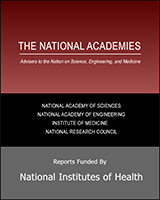NCBI Bookshelf. A service of the National Library of Medicine, National Institutes of Health.
Excerpt
The emergence of a novel human coronavirus in late 2002 alarmed populations across the globe, elicited a massive public health response, gave rise to a multinational research network, gripped the news media, wreaked political havoc in China, and struck a blow to the tourism and travel industries of several countries. By the time this coronavirus, labeled SCoV, apparently receded from human hosts in July 2003, nearly 10 percent of more than 8,000 individuals who fit the probable case definition had died of the disease now known as severe acute respiratory syndrome (SARS) (World Health Organization [WHO], 2003a). Analyses of this epidemic could lead to improvements in the global community’s preparedness for and response to future global outbreaks of infectious disease.
For these reasons, the Institute of Medicine’s (IOM’s) Forum on Microbial Threats convened the workshop Learning from SARS: Preparing for the Next Disease Outbreak on September 30 and October 1, 2003. Participants discussed the emergence, detection, spread, and containment of SARS; political responses to the epidemic; its economic consequences; basic research on coronaviruses; preparations for a possible reemergence of SCoV; and lessons learned from the SARS epidemic that could shape responses to future microbial threats.
Contents
- THE NATIONAL ACADEMIES
- FORUM ON MICROBIAL THREATS
- BOARD ON GLOBAL HEALTH
- Reviewers
- Preface
- Summary and Assessment
- 1. SARS: Emergence, Detection, and Response
- OVERVIEW
- THE WHO RESPONSE TO SARS AND PREPARATIONS FOR THE FUTURE
- THE CENTERS FOR DISEASE CONTROL AND PREVENTION’S ROLE IN INTERNATIONAL COORDINATION AND COLLABORATION IN RESPONSE TO THE SARS OUTBREAK
- ROLE OF CHINA IN THE QUEST TO DEFINE AND CONTROL SARS
- SARS: LESSONS FROM TORONTO
- ISOLATION AND QUARANTINE: CONTAINMENT STRATEGIES FOR SARS 2003
- IMPACTS OF SARS ON HEALTH CARE SYSTEMS AND STRATEGIES FOR COMBATING FUTURE OUTBREAKS OF EMERGING INFECTIOUS DISEASES
- REFERENCES
- 2. Political Influences on the Response to SARS and Economic Impacts of the Disease
- 3. Microbiology, Ecology, and Natural History of Coronaviruses
- 4. Diagnostics, Therapeutics, and Other Technologies to Control SARS
- OVERVIEW
- EVALUATION OF REVERSE TRANSCRIPTION-PCR ASSAYS FOR RAPID DIAGNOSIS OF SEVERE ACUTE RESPIRATORY SYNDROME ASSOCIATED WITH A NOVEL CORONAVIRUS
- NOVEL BIOSENSOR FOR INFECTIOUS DISEASE DIAGNOSTICS
- IN VITRO ANTIVIRAL ACTIVITY OF HUMAN RHINOVIRUS 3C PROTEASE INHIBITORS AGAINST THE SARS CORONAVIRUS
- SARS: CLEARING THE AIR
- REFERENCES
- 5. Preparing for the Next Disease Outbreak
- APPENDIXES
- Appendix A Learning from SARS: Preparing for the Next Disease Outbreak
- Appendix B Clinical Guidance on the Identification and Evaluation of Possible SARS-CoV Disease Among Persons Presenting with Community-Acquired Illness,
- Appendix C In the Absence of SARS-CoV Transmission Worldwide: Guidance for Surveillance, Clinical and Laboratory Evaluation, and Reporting,
- Appendix D Selected Bibliography
- Appendix E Glossary and Acronyms
- Appendix F Forum Member, Speaker, and Staff Biographies
Support for this project was provided by the U.S. Department of Health and Human Services’ National Institutes of Health, Centers for Disease Control and Prevention, and Food and Drug Administration; U.S. Agency for International Development; U.S. Department of Defense; U.S. Department of State; U.S. Department of Veterans Affairs; U.S. Department of Agriculture; American Society for Microbiology; Burroughs Wellcome Fund; Pfizer; GlaxoSmithKline; and The Merck Company Foundation.
The views presented in this report are those of the editors and attributed authors and are not necessarily those of the funding agencies.
This report is based on the proceedings of a workshop that was sponsored by the Forum on Microbial Threats. It is prepared in the form of a workshop summary by and in the name of the editors, with the assistance of staff and consultants, as an individually authored document. Sections of the workshop summary not specifically attributed to an individual reflect the views of the editors and not those of the Forum on Microbial Threats. The content of those sections is based on the presentations and the discussions that took place during the workshop.
NOTICE: The project that is the subject of this report was approved by the Governing Board of the National Research Council, whose members are drawn from the councils of the National Academy of Sciences, the National Academy of Engineering, and the Institute of Medicine.
- NLM CatalogRelated NLM Catalog Entries
- Review Infectious Disease Movement in a Borderless World: Workshop Summary[ 2010]Review Infectious Disease Movement in a Borderless World: Workshop SummaryInstitute of Medicine (US) Forum on Microbial Threats. 2010
- Review Fungal Diseases: An Emerging Threat to Human, Animal, and Plant Health: Workshop Summary[ 2011]Review Fungal Diseases: An Emerging Threat to Human, Animal, and Plant Health: Workshop SummaryInstitute of Medicine (US) Forum on Microbial Threats. 2011
- Confronting SARS: a view from Hong Kong.[Philos Trans R Soc Lond B Biol...]Confronting SARS: a view from Hong Kong.Peiris JS, Guan Y. Philos Trans R Soc Lond B Biol Sci. 2004 Jul 29; 359(1447):1075-9.
- SARS: UK public health response--past, present and future.[Commun Dis Public Health. 2003]SARS: UK public health response--past, present and future.Chow JY, Anderson SR, Delpech V, Leese J, Horby P, Sedgwick JE, Rooney CI, Nicoll A, Watson JM. Commun Dis Public Health. 2003 Sep; 6(3):209-15.
- Lessons learned from international responses to severe acute respiratory syndrome (SARS).[Environ Health Prev Med. 2005]Lessons learned from international responses to severe acute respiratory syndrome (SARS).Oshitani H. Environ Health Prev Med. 2005 Sep; 10(5):251-4.
- Learning from SARSLearning from SARS
Your browsing activity is empty.
Activity recording is turned off.
See more...
